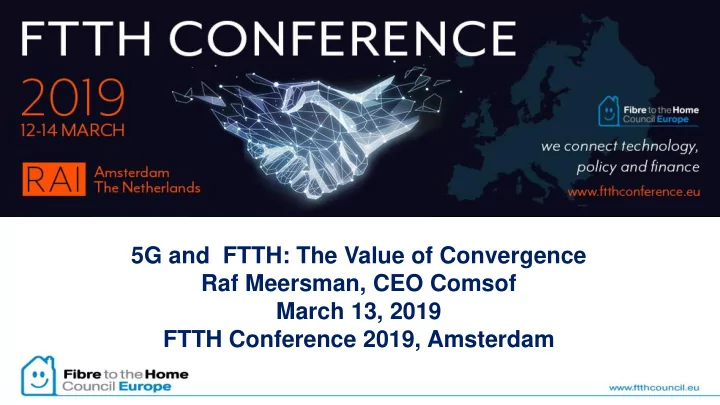

5G and FTTH: The Value of Convergence Raf Meersman, CEO Comsof March 13, 2019 FTTH Conference 2019, Amsterdam
5G is a Hype
5G ≠ 4G * Source: Qualcomm Current Study: Future Networks: Sub-6Ghz (3,5Ghz) 60Ghz? Mmwave (26Ghz) 6G? 10G?
Impact of frequency on coverage * Source: Siradel
5G and Fibre A game changer, where wireless can no longer exist without wireline Densification • Wireless High BW • Backhaul • Autonomous driving, games Fibre Low Latency • C-RAN/ Fronthaul • Higher Lower Frequency Convergence Reach • Small Cells = FTT-5G
Objectives of our FCGA Study Convergence Range of Savings Between Fibre for 5G and FTTH Urban vs Rural Impact of Assumptions Timing aspects
36 Scenarios Cable Area Density Cell Density Fibre Count Timing Deployment Urban (High Conservative Dense - City (eg. 3,5 Ghz) Centre) High Fiber separate FTTH Underground Count and FTT5G Suburban Medium (Medium Dense (Mix) - Residential) A fully Low Fiber Overhead converged Count FTTH+FTT5G Rural (Low High Density - (eg. 26 Ghz) Village)
Today: focus on 9 scenarios Cable Area Density Cell Density Fibre Count Timing Deployment Urban (High Conservative Dense - City (eg. 3,5 Ghz) Centre) High Fiber separate FTTH Underground Count and FTT5G Suburban Medium (Medium Dense (Mix) - Residential) A fully Low Fiber Overhead converged Count FTTH+FTT5G Rural (Low High Density - (eg. 26 Ghz) Village)
3 Areas Urban Suburban Rural Medium Dense Low Dense High Dense • 5,7k Buildings • 7,1k Buildings • 4k Buildings • 7,1k Homes • 5,7k Homes • 30k Homes • 95 inhabitants/km² • 3,5k inh/km ² • 24k inh/km² • Lots of “Visitors”
Cell Density – Example on City Centre Macro Sites at 3,5 Ghz (6) Current Macro Sites (6)
Cell Density – Stage 1: 5G from Macro Sites (3,5 Ghz) Macro Sites at 3,5 Ghz (6) Macro Sites at 3,5 Ghz (6) x1 6 6
Cell Density – Stage 2: 5G Small Cells (3,5 Ghz) Macro Sites at 3,5 Ghz (6) Macro Sites at 3,5 Ghz (6) Small Cells at 3,5 Ghz (11) x3 6 17
Cell Density Small Cells Macro Cells Source: Siradel (Volcano Model)
Cell Density – Stage 3: 5G Hotspots (26Ghz) Macro Sites at 3,5 Ghz (6) Macro Sites at 3,5 Ghz (6) Small Cells at 3,5 Ghz (11) Indoor Hotspots (13) x5 6 30
Cell Density – Stage 4: 5G Small Cells (26Ghz – 50% coverage) Macro Sites at 3,5 Ghz (6) Small Cells at 3,5 Ghz (11) Indoor Hotspots (13) Small Cells at 26 Ghz (11+29) x10 6 59
Cell Density – Stage 5: 5G Small Cells (26Ghz – 95% coverage) Small Cells Small Cells Macro Cells Source: Siradel (Volcano Model)
Cell Density – Stage 5: 5G Small Cells (26Ghz – 95% coverage) Macro Sites at 3,5 Ghz (6) Small Cells at 3,5 Ghz (11) Indoor Hotspots (13) Small Cells at 26 Ghz (11+87) x20 6 117
Cell Density – FTT-5G Low Density (30) High Density (117) Source: Comsof (Comsof Fiber)
Convergence Fiber cable Homes on FTTH 5G Small Cells Source: Comsof (Comsof Fiber)
Costs INCLUDED EXCLUDED • OSP Fiber Network • Fiber Active Equipment • Trenching • 5G Active Equipment • Ducts • 5G Site Acquisition • Cables • 5G Spectrum • Closures • Poles • ISP Central Office • ODF • Racks
RESULTS
Example result (conceptual) Percentage of Value of convergence Cost FTT Value of convergence the FTT5G cost Extra FTTH investment to be 5G ready 5G that could be = saved through Cost FTT5G convergence Cost FTTAll Cost FTTH conver ged Extra Extra FTTH investment to Investment on be 5G ready top of FTTH to = make it 5G Cost FTTH ready
65% to 96% of FTT5G cost can be eliminated
Between 0,5% and 7% of extra investment on top of FTTH needed
Results High Dense Cells Medium Dense Low Dense Cells Cells High Dense Area 74% -- 5,6% 75% -- 3,8% 96% -- 0,4% Medium Dense Area 75% -- 7,2% 83% -- 3,2% 93% -- 0,8% Low Dense Area 65% -- 6,6% 81% -- 2,7% 85% -- 1,9% % of FTT5G saved by convergence -- % of extra investment to make FTTH 5G-ready
Between 65% and 96% of Fibre costs for 5G xHaul can be eliminated by rolling out an optimised and future proof converged fibre network
In some cases the cost for fibre to 5G can be virtually eliminated which can potentially decrease the total cost of 5G by order of 50%
The extra investment needed to immediately make an FTTH network ready for 5G (even for high density of cells) is only 1% to 7% A risk worth taking?
Thank you! Questions? This study was realized with valuable contributions from all FTTH Council organisations worldwide. Specials thanks to the core group including Erzsebet Fitori, Joël Mau, Tony Shortall, Comsof (Raf Meersman, Kevin Wynne, Jonas Verstuyft), Commscope (Vincent Garnier, Pedro Torres), Corning (Mike Knott, Vanesa Diaz), Rala (Tobias Ahl, Karin Ahl), Open Fiber (Luigi Gambardella, Edoardo Fagiolini) Special thanks to Siradel and Prof I. Tomkos (AIT) for their valuable contribution on 5G assumptions and technologies.
Thank you for your attention! Stay tuned for more details about the study via www.ftthcouncil.eu
Recommend
More recommend